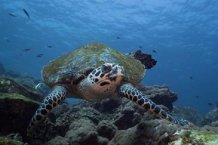Articles

The plan aims to protect fisheries and marine life, including sea turtles.
Exeter helps protect Myanmar marine life
A new plan to protect Myanmar’s diverse marine life has been announced.
The plan, created with help from the University of Exeter, aims to protect fisheries and marine life – including dolphins and sea turtles – and other marine resources.
It was announced by the government of Myanmar and WCS (Wildlife Conservation Society) at this week’s World Ocean Summit in Bali, Indonesia.
“The Union of the Republic of Myanmar is focused on balancing natural resource use across all production sectors, while providing investment opportunities and economic prosperity for its people,” said U Hla Kyaw, Deputy Director of the Ministry of Agriculture, Livestock and Irrigation (Department of Fisheries).
“We believe this strategy provides us with a robust structure through which to develop this goal and our ocean economy.”
Myanmar representatives and scientific collaborators also announced the publication of a supporting document – the “Myanmar Marine Biodiversity Atlas” – which will provide natural resource managers with a foundation of spatial data for directing management strategies.
Dr Matthew Witt, from the University of Exeter’s Environment and Sustainability Institute, said: “It has been a great privilege to develop with partners a resource that can be used in future marine spatial planning activities.
"We hope the atlas will help guide discussions and decision support around sustainable use of Myanmar’s coastal and offshore environments, upon which many are dependent for food, employment and biodiversity services.”
As mainland Southeast Asia’s largest country, Myanmar boasts a vast marine region covering some 486,000 sq km, most of which is currently unprotected.
The country’s extensive coastal areas provide vital habitats for species such as the finless porpoise, several species of sea turtle, and the dugong (a relative of the manatee).
The waters of Myanmar also contribute significantly to the country’s economy and provide livelihoods for an estimated 1.4 million inshore and offshore fishers.
Local and commercial fisheries also provide food for millions, but illegal fishing has decimated local fish populations and could put the country’s food security at risk if not regulated.
The country’s sovereign waters are also being explored for coastal development opportunities and gas reserves.
The new marine spatial planning strategy was produced by Myanmar’s Department of Fisheries, the Ministry of Natural Resources and Environmental Conservation, with technical guidance from WCS, University of Exeter and Pyoe Pin (a program that provides assistance to democratic and accountable governance).
“Myanmar is a country undergoing great change as its engagement with the international community increases,” said Martin Callow, Advisor to WCS’s Myanmar Marine Conservation Program.
“At the same time, the country’s irreplaceable marine heritage is at risk from this new spirit of openness.
“The new marine spatial planning strategy fills an urgent need to understand current and future marine resource use and how these activities can be combined into a coordinated plan for a sustainable ocean economy.”
Date: 24 February 2017
